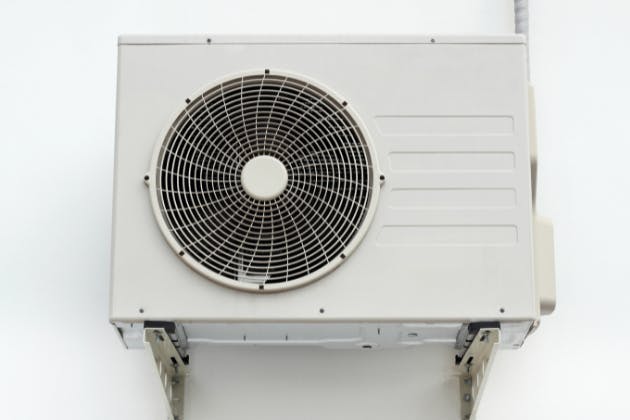An air source heat pump is an excellent option to move from fossil fuels to green heating. Not only does this lower your carbon footprint but it also helps reduce heating bills. Even though they have been available for time, the focus on the UK's 2050 net-zero targets, as well as current government incentives, makes a heat pump the natural choice for updating your home's heating. Understandably, there may be some concerns about going against the grain, which can lead to a lot of disinformation.
Here at Green and Reliable, we go through some of the popular heat pump myths in this blog.

What are some of the air source heat pump myths?
Myth 1: They can only be installed in new build homes
Modern heat pumps may be easily installed in a variety of properties, from semi-detached houses to high-rise flats. We recommend checking with your local planning authority to check if you need to apply for planning permission to install air source heat pumps, especially if you live in a conservation area or have a listed house.
Myth 2: They are noisy
Heat pumps being noisy are a common misconception people have about them. However, you will be glad to know that is is not always the case. The reason being is because the design of it has changed over time. They are smaller, more efficient and to compare, create the same level of noise as the fridge in your kitchen.
Myth 3: They do not work during the winter
Air source heat pumps can be used all year, even during winter. When the outside air temperature drops, the effectiveness of air source heat pumps decreases. However, when this happens, they are still able to extract heat from the air.
Myth 4: You need to have underfloor heating
Not only can you use underfloor heating with heat pumps but you can also use them with radiators. By spreading heat at lower temperatures for extended periods of time, we recommend installing larger radiators to take full advantage of the benefits of heat pumps. You also need to ensure that your home is well-insulated to help decrease the chances of heat loss.
Myth 5: They are too expensive
Even though air source heat pumps are slightly costly, there are government grants put in place to help you with your purchase.
According to the newly reported government scheme, known as RHI, you may be entitled to quarterly payments. This scheme aims to expand the use of renewable heating solutions in homes across the United Kingdom. Find out if you are eligible for this scheme by heading over to the gov.co.uk website.
Myth 6: They require more maintenance
A yearly service is recommended for any type of heating system, whether it's a boiler or an air source heat pump. This is to help extend its lifespan and guarantee it's running efficiently. Furthermore, it also ensures the validity of your warranty.
An air source heat pump has a usual lifespan of 15-20 years, which is slightly longer than a boiler but comparable to a boiler's lifespan of 10-15 years.
Air source heat pumps are extremely reliable and the biggest advantage they have is that they require little to no maintenance. In case anything does go wrong with your boiler, you have the manufacturer warranty, giving you peace of mind.
How to avoid Myths About Air Source Heat Pumps?
To avoid air source heat pump misconceptions and acquire reliable information, engage with heating professionals that are informed and experienced in the industry. Here are some things you can do:

Seek help from skilled heating professionals
Contact respected heating engineers who specialise in air source heat pumps for advice. They have the knowledge and expertise to deliver correct information and remove any misunderstandings or misconceptions.
Conduct thorough research
Collect information from trustworthy sources, such as reputable heating engineer websites, industry magazines, and government databases. Look for information that is relevant to the British context to ensure that it is in accordance with local legislation and standards.
Attend informational events or seminars
Keep an eye out for air source heat pump-focused events or seminars organised by heating engineers or industry organisations. These programmes frequently provide opportunity to learn directly from professionals and to address any misunderstandings or misconceptions.
Request case studies or testimonials
Request case studies or testimonials from customers who have successfully installed and utilised air source heat pumps from heating engineers. Real-world examples will help you comprehend the advantages, performance, and efficiency of these systems, as well as dispel any falsehoods you may have heard.
Compare information from multiple sources
Cross-reference data from trustworthy sources such as heating engineers, manufacturers, and industry organisations. You can discover consistent facts and separate them from myths or misinformation by comparing information.
Remember that talking with competent heating specialists and depending on reliable and up-to-date information are critical to making informed selections about air source heat pumps in the UK.
Air source heat pump maintenance
Air source heat pump maintenance is critical to ensuring the system's optimal performance, energy efficiency, and lifespan. Here are some important air source heat pump maintenance tasks:
Remove dirt and debris from air filters on a regular basis to maintain airflow and efficiency. Replace any broken or severely dirty filters.
Keep the outdoor unit clear of impediments, such as leaves or other debris, to ensure optimal ventilation.
To minimise dirt buildup and maintain effectiveness, regularly check and clean the evaporator and condenser coils. Follow the manufacturer's instructions or hire an expert.
Refrigerant levels should be checked because they affect performance. Check and adjust levels as needed by a skilled heating engineer.
Examine electrical connections to ensure that they are safe and secure in order to avoid performance problems and safety hazards. If repairs are required, contact a qualified technician.
Arrange for a heating engineer to visit your home on an annual or biannual basis for thorough inspections, cleaning, adjustments, and problem-solving.
Remember to check the manufacturer's specific maintenance guidelines for your air source heat pump, as they may have extra recommendations or needs. Maintaining your air source heat pump on a regular basis will help it run more efficiently and last longer.
Speak to a qualified installer
If you have any questions about air source heat pumps, we are here to help! Our heating engineers are fully trained and qualified when it comes to installing air source heat pumps across Malton, Wetherby and York. Get in touch today by calling us on 0800 118 2467 or 07717 574 470 and we'll be happy to help.


